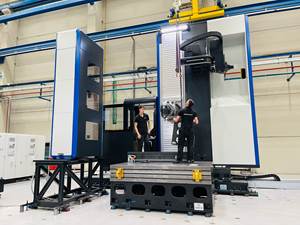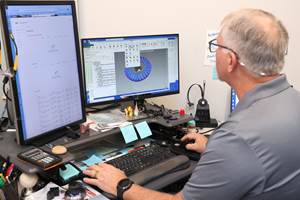Swiss-Type Lathe Helps Medical Shop Achieve Higher Precision
After a new Swiss-type lathe exceeded company management’s expectations in terms of both performance and efficiency, the lathe is now included in plans for future applications.
Share






Landing new projects for a machine shop often calls for capabilities that sometimes it does not have. When this happens, shop management must decide between finding another shop that can do the work or purchasing new equipment to satisfy customer demands. in Alajuela, Costa Rica, won two jobs around the same time that required the shop to make that decision. Looking into the future, management chose to invest in a new Swiss-type lathe. Not only were management’s expectations exceeded by the machine’s performance and efficiency, but the lathe is now included in plans for future applications.

Mario Chaves, general manager of Okay Industries Costa Rica, and Kendrick Miranda, sales representative at Mayprod in Costa Rica, stand in front of the Tornos SwissNano.
Okay Industries launched in 2012 as a medical precision components manufacturer that uses multi-axis CNC machine tools, Swiss-type turning, die-sinking, wire EDM and general machining. Materials used include stainless steels, implantable titanium and nitinol. The company, which employs 65 people, also specializes in automotive, defense/firearms and industrial applications. The company headquarters is in New Berlin, Connecticut.
When the company won the job of producing a 1.5-by-1.5-mm medical device used in breast cancer surgery, General Manager Mario Chaves realized that he needed to take the shop’s Swiss-type capabilities to the next level. Already experienced and impressed with its Swiss GT 26 from Tornos Technologies, which had cut the shop’s cycle times on specific parts by more than 50%, Mr. Chaves again turned to the manufacturer for this new acquisition.
He visited Tornos’ headquarters in Switzerland to commission a SwissNano Swiss-type and then worked with Mayprod, his local Tornos distributor in Central America, to implement the machine at Okay Industries. This investment made Okay the first manufacturer in Latin America to own a SwissNano, which machines parts 4 mm in diameter and smaller.

José Ulate, machine technician, is ready to launch production on the Tornos SwissNano at Okay Industries.
“The SwissNano has exceeded our expectations by demonstrating very good stability on the required part dimensions,” Mr. Chaves says. “In our first part runs on the lathe, the results were impressive, with virtually no variation between the first part and the 200th part.”
Tisis programming software, Tornos’ Industry 4.0 portal, addresses and improves the human element of manufacturing, Mr. Chaves says, which is important to him. “One of the chief reasons I joined the Okay Industries family was company President Jason Howey’s focus on and interest in people,” he says. “We are keeping pace with the big trends influencing medical component manufacturing. Parts are becoming smaller and customers are requiring more solutions. We want to be the partner that can provide the best end results with the best price and technologies.”
With this goal in mind, Mr. Chaves is already imagining the machine’s potential for other applications. He also sees a bright future for Okay Industries by continuing to collaborate with Tornos. “There are a lot of opportunities for Tornos and our company. In fact, when we were at Tornos’ headquarters, I was very impressed with the MultiSwiss, a machine that combines the sliding headstock advantages of a Swiss with the production capabilities of a multi-spindle,” he says. He has been seeking a project that could justify the purchase.
Meanwhile, its new Swiss-type lathe helps keep Okay Industries’ manufacturing on track to keep pace with the medical industry’s demands for smaller parts with higher precision while still being competitively priced in the market.
Related Content
Controlling Extreme Cutting Conditions in Large-Part Machining
Newly patented technologies for controlling chatter and vibration during milling, turning and boring operations promise to drastically reduce production time and increase machining performance.
Read MoreCustom Workholding Shaves Days From Medical Part Setup Times
Custom workholding enabled Resolve Surgical Technologies to place all sizes of one trauma part onto a single machine — and cut days from the setup times.
Read MoreTTI Brings Specialty Gear Production In-House with Multiaxis Machining
By investing in a 3+2-axis machine and utilizing simulation software for diagnostic checks, Techtronic Industries turned a four- to ten-week lead time into a one- to two-week lead time.
Read MoreMultitasking Machines Cut Days From Shop’s Setups
Adopting WFL Millturn machines enabled BWXT to condense operations and setups while also providing a simple way to simulate and secure processes.
Read MoreRead Next
AMRs Are Moving Into Manufacturing: 4 Considerations for Implementation
AMRs can provide a flexible, easy-to-use automation platform so long as manufacturers choose a suitable task and prepare their facilities.
Read MoreLast Chance! 2025 Top Shops Benchmarking Survey Still Open Through April 30
Don’t miss out! 91ÊÓƵÍøÕ¾ÎÛ's Top Shops Benchmarking Survey is still open — but not for long. This is your last chance to a receive free, customized benchmarking report that includes actionable feedback across several shopfloor and business metrics.
Read MoreMachine Shop MBA
Making Chips and 91ÊÓƵÍøÕ¾ÎÛ are teaming up for a new podcast series called Machine Shop MBA—designed to help manufacturers measure their success against the industry’s best. Through the lens of the Top Shops benchmarking program, the series explores the KPIs that set high-performing shops apart, from machine utilization and first-pass yield to employee engagement and revenue per employee.
Read More





















